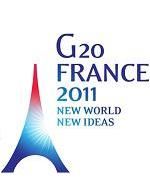International - Written by Barry & Richard on Monday, November 14, 2011 16:04 - 0 Comments
G20 Cannes – 8 things you didn’t know were on the agenda, the Arab Spring & the global fight against corruption
 Speaking last week in London the Director of the SFO was keen to highlight one area of the G20 summit in Cannes which did not receive much coverage for obvious reasons.
Speaking last week in London the Director of the SFO was keen to highlight one area of the G20 summit in Cannes which did not receive much coverage for obvious reasons.
Speaking about anti-corruption the Director said:
“[Anti-corruption] is a subject that develops very rapidly. Indeed, the most recent development to my mind comes from the G20 at the end of last week in connection with the G20 Action Plan. There were one or two other issues discussed by the G20 last week which perhaps meant that this did not receive as much coverage as it should. But I was struck by the continuing commitment of the G20 to anti-corruption work and the impetus that they are giving to this.”
It is not surprising that the anti-corruption element of the G20 summit in Cannes was overshadowed by the tumultuous markets and the economic uncertainty hanging over the Eurozone and elsewhere.
However, in a release issued by the G20 the 8 most significant achievements achieved by members were outlined. Some of the achievements would have been unthinkable not so long ago and highlight the global anti bribery trend:
- the ratification by India of the United Nations Convention against Corruption (UNCAC);
- the decision by Russia to join the OECD Convention on Combating Bribery of Foreign Public Officials in International Business Transactions.
- the entry into force in China of a law criminalizing international corruption;
- the adoption by the European Commission of the Anti-Corruption package in June 2011;
- the entry into force in South Korea of a law protecting whistleblowers;
- the creation of a national anti-corruption agency in Saudi Arabia;
- the entry into force of a new law on international corruption in the United Kingdom;
- the enactment of the Dodd-Frank Act in the United States.
When considering anti-corruption compliance and possible amendment of the FCPA and/or criticism of the Bribery Act, it is worth keeping in mind the global picture. That is a picture where steps are being taken around the world (even in countries traditionally considered to have no interest in anti-corruption enforcement) to adopt anti-corruption laws.
In the same speech Mr. Alderman said:
“We have seen some very interesting developments as a result of the Arab Spring and also in other countries. There is now much greater recognition of the fact that corruption is a truly significant problem in various jurisdictions and that it is a feature of the culture in those countries that its citizens are no longer prepared to tolerate.”
Coincidentally Lanny Breuer, Mr. Alderman’s counterpart at the US Department of Justice in the context of international anti-corruption enforcement, had this to say to an audience in Washington DC on the same day:
“Last December, in what led to a period that many have referred to as the “Arab Spring,” a young Tunisian man named Mohammed Bouazizi had his fruit cart confiscated from him and subsequently set himself on fire. As President Obama said in a speech last May, Bouazizi’s “act of desperation tapped into the frustration felt throughout [Tunisia],” leading hundreds and then thousands of protesters to take to the streets and demand the ouster of a dictator who had held power for more than 20 years.
Why did Bouazizi and his countrymen and women feel so desperate? There were undoubtedly many reasons. But one was surely the pervasive corruption they were up against.”
“…Bouazizi’s tale is not unique across North Africa and the Middle East. And, of course, the problem of corruption is not limited to that region of the world.
Corruption corrodes the public trust in countries rich and poor and has particularly negative effects on emerging economies. When a developing country’s public officials routinely abuse their power for personal gain, its people suffer. At a concrete level, roads are not built, schools lie in ruin and basic public services go unprovided. At a more abstract, but equally important, level, political institutions lose legitimacy, and people lose hope that they will ever be able to improve their lot.
The fight against corruption is a law enforcement priority of the United States, and it is also a personal priority of mine. There are few more destructive forces in society than the effect of widespread corruption on a people’s hopes and dreams, and I believe it is incumbent upon us to work as hard as we can to eradicate corruption across the globe.”
There is no doubt that the Arab Spring is widely seen as sparked, in part, as a result of corruption and that there is a sense that the tide has turned against permitting it.
Swimming against the tide is rarely recommended.


